
Psoriasis and Natural Support for Skin Health
Overview and Symptoms
Psoriasis is a chronic skin condition affecting over 7 million Americans. It’s marked by rapid skin cell replication, leading to thick, red patches or plaques covered with silvery scales. Unlike normal skin cells that regenerate every 19 days, psoriatic cells reproduce daily, resulting in an accelerated build-up of cells on the skin’s surface. Treatments for psoriasis often involve topical ointments, ultraviolet light therapy, and lifestyle changes. While long-term UVL treatment has shown notable improvements, it may increase the risk of skin cancer. Always consult a dermatologist before pursuing UVL therapy.
Holistic perspectives suggest that an overload of acidic toxins in the digestive system may leak into the bloodstream, worsening symptoms. As one German scientist noted, “Psoriasis is not strictly a skin disorder. It’s a metabolic disturbance triggered by environmental or stressful conditions like faults in the diet, flu-like conditions, the administration of penicillin, surgery, or autoimmune diseases.” This condition can be further complicated by yeast infections, food allergies, and nutritional deficiencies.
Chinese Medicine, Chakras, and Emotions
In Traditional Chinese Medicine (TCM), psoriasis links to imbalances in the Liver and Spleen meridians. The Liver ensures the smooth flow of Qi (energy) and blood, and when stagnant, it can show up as skin issues. Emotional factors like anger, frustration, and stress, related to Liver Qi stagnation, can worsen psoriasis symptoms. Treatments such as acupuncture and herbal remedies help balance these meridians to manage symptoms.
From a chakra viewpoint, psoriasis connects to the Solar Plexus Chakra (Manipura), which governs personal power, self-esteem, and digestion. Blockages in this chakra can cause skin disorders, especially those triggered by stress and emotional imbalances. Addressing emotional health through stress management techniques, mindfulness, and emotional support can enhance both skin health and overall well-being.
Causes and Triggers
Impaired Metabolism and Immune System
Psoriasis may result from rapid skin growth due to problems with prostaglandin regulation, faulty fat metabolism, and essential fatty acid deficiency. Omega-3 and Omega-6 fatty acids, particularly from oils like flaxseed and primrose oil, support skin health by increasing fat metabolism and reducing inflammation. Including these fatty acids in the diet can help reduce eruptions and improve skin condition.
A weakened immune system, often due to conditions like leaky gut syndrome and intestinal dysbiosis, can make psoriasis worse. Zinc is vital for protein metabolism and skin healing. It also supports cortisol production, helping to manage inflammation. Zinc deficiency is common in psoriasis, so supplementation can benefit skin health. Combine zinc with copper to avoid imbalance.
Toxins, Free Radicals, and Liver Function
Environmental toxins and those from an unhealthy colon contribute to skin inflammation. These toxins can worsen psoriasis, highlighting the importance of maintaining gut health. Probiotics like Lactobacillus help keep gut flora balanced, reducing symptoms. Foods rich in probiotics, like sauerkraut and kefir, can aid detoxification and improve skin health.
Impaired liver function and incomplete protein digestion can lead to an overload of acidic toxins in the body. Supporting the liver with milk thistle helps promote detoxification and reduce flare-ups. Milk thistle increases bile flow, aiding the body’s natural detox process and improving blood cleanliness. Other liver-supporting herbs include dandelion and artichoke.
Stress, Hormones, and Heredity
Stressful events, adrenal insufficiency, hormonal changes, and emotions like anger and anxiety can trigger or worsen psoriasis. Vitamin B-complex supplements help the body manage stress, aid skin cell production, and support overall skin health. These vitamins also strengthen the immune system. Genetics play a role, with infants at higher risk of developing psoriasis if their mothers had the condition.
Dietary Considerations
Dietary Guidelines for Psoriasis
A diet rich in raw foods, fresh fruits, vegetables, whole grains, and fish helps maintain a healthy colon and reduces inflammatory triggers. High-fiber foods support the digestive system, easing symptoms. Avoid processed foods, fried foods, pork, dairy, and other animal fats, as they can worsen the condition.
Elimination Diet and Omega-3 Fatty Acids
Desensitizing food allergies through an Elimination Diet helps identify triggers like eggs, dairy, nuts, wheat gluten, and soy. This process helps tailor dietary choices to avoid exacerbating the condition. Omega-3 fatty acids, found in fish oil, provide anti-inflammatory benefits that can help manage psoriasis. Fish oil supplements can reduce the severity of psoriasis after consistent use for 2-3 months.
Turmeric and Probiotics
Including anti-inflammatory foods like turmeric (curcumin) can help reduce inflammation and improve skin texture. Incorporating probiotics like Lactobacillus in the diet can improve gut flora balance and reduce psoriasis symptoms. Foods rich in probiotics like yogurt, kefir, and fermented vegetables support digestive health.
Managing Symptoms and Natural Support
Detoxification and Liver Support
Whole-body detoxification that includes the liver and bowel can acutely benefit psoriasis patients. Herbal laxatives and fiber supplements support detoxification, while pure water, raw fruits, and vegetables help cleanse the system. A liver detox also helps reduce the overload of acidic toxins in the body. Adding milk thistle in combination with dandelion, artichoke, and corydalis further supports liver function.
Topical Treatments and Skin Care
Topical treatments can provide temporary relief for psoriasis symptoms. Salves with ingredients like Aloe vera, calendula, and Oregon grape can soothe the skin and reduce inflammation. Aloe vera provides a cooling effect, reducing redness and irritation. Omega-3 oils applied to the skin, like fish oil, can also reduce dryness and irritation, improving overall skin condition.
Sun Exposure and Vitamin D
Moderate sunbathing for 10-15 minutes daily helps with vitamin D production, crucial for skin health and immune function. Poor use of vitamin D can worsen psoriasis. Sun exposure and supplements help balance the immune system and promote healthy skin cell production. For persistent psoriasis, applying 1,25-dihydroxyvitamin D3 topically has been effective. Limit sun exposure to avoid skin damage and consult a healthcare professional for guidance.
Nutritional and Herbal Support
Vitamin A (Beta-Carotene) and Zinc
Vitamin A is essential for tissue maintenance, skin protection, and repair. It reduces inflammation and supports healthy skin cell growth. High doses should be used under a healthcare provider’s supervision, especially for those with liver disease or who smoke. Zinc is crucial for protein metabolism and healing of the skin. It also supports cortisol production, helping to manage inflammatory responses.
Coleus Forskohlii and Echinacea
Coleus Forskohlii contains forskolin, which activates cyclic AMP, reducing histamine release and cell growth. It may also reduce inflammation related to psoriasis. Echinacea boosts immune function and can be used both topically and orally to support skin health and lessen psoriasis and atopic dermatitis symptoms.
Turmeric and Whole-Food Green Powders
Turmeric is known for its anti-inflammatory and antioxidant properties. It can reduce inflammation and improve skin texture. Whole-food green powders packed with nutrition, enzymes, and antioxidants detoxify the body, aiding in symptom management.
Lifestyle and Emotional Balance
Stress Management
Managing stress through practices like yoga, meditation, and mindfulness can significantly affect psoriasis. Emotional factors such as anger, frustration, and stress play a role in flare-ups. Essential oils like lavender, geranium, and sandalwood in aromatherapy can offer symptom relief and promote emotional balance.
Chakra and TCM Approaches
Balancing the Liver and Spleen meridians through acupuncture, acupressure, and herbal medicine can address the root causes of psoriasis. Practices like Qi Gong and Tai Chi help promote the smooth flow of Qi and reduce emotional stagnation.
Conclusion
Managing psoriasis requires a holistic approach that includes diet, lifestyle, emotional health, and natural support. Incorporating TCM principles, chakra balancing, dietary adjustments, and natural remedies helps individuals manage symptoms and promote skin health. Always consult with a healthcare professional before starting any new treatment plan, particularly for chronic conditions like psoriasis.


